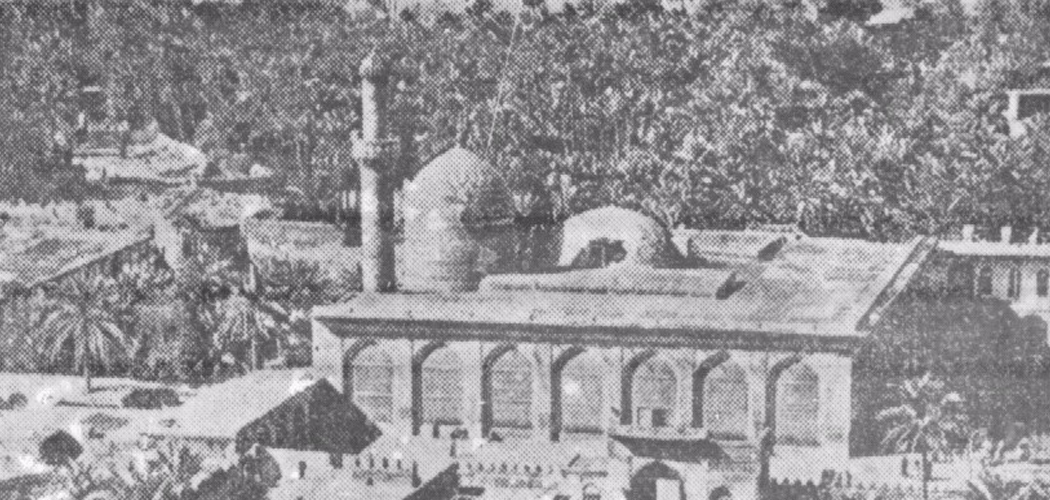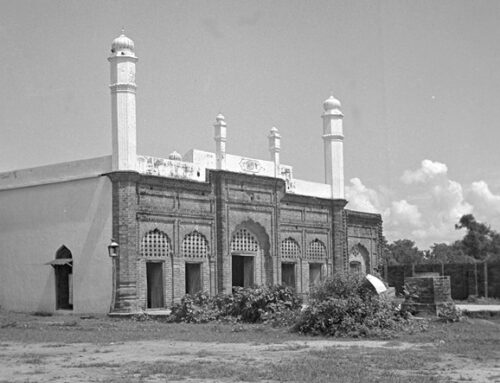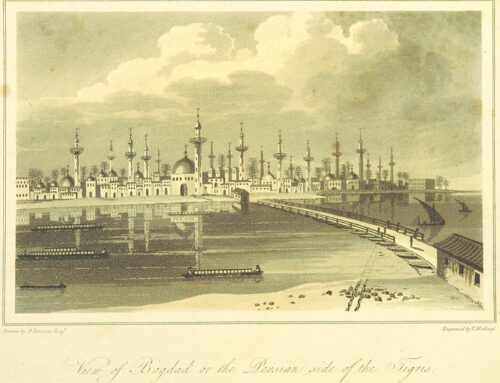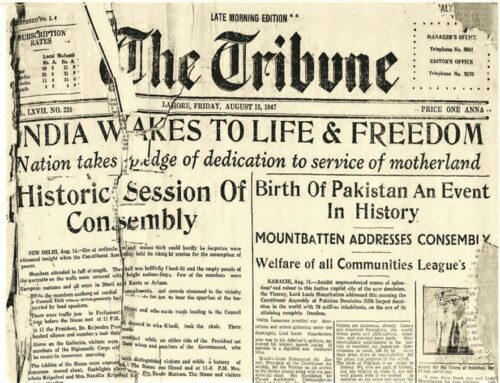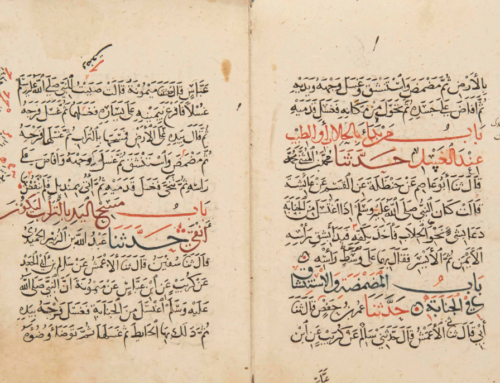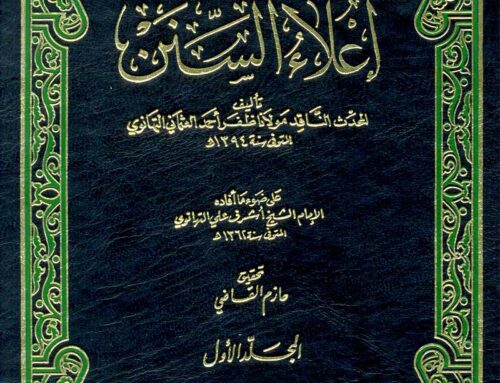Translated by Zameelur Rahman
Know that the majority of hadith-scholars agree that a man becomes a Tabi‘i by merely having met a Sahabi and having seen him, and it is not a condition that he accompanies him for a period of time and narrates from him. [Al-Suyuti] said in Tadrib al-Rawi on the definition of a Tabi‘i:
It was said: he is one who met him [i.e. a Sahabi], although he did not accompany him, as was said on [the definition of] a Sahabi, and al-Hakim agrees with this. Ibn al-Salah said: “It is closest [to the truth].” The author [i.e. al-Nawawi] said: “It is most apparent.”
Al-‘Iraqi said: “The practice of the majority of the scholars of hadith is based on this, for indeed Muslim and Ibn Hibban included al-A‘mash amongst the generation of the Tabi‘in.” Ibn Hibban said: “We have included him in this generation because he had met [with a Sahabi] and had recollection [of that meeting]. He saw Anas although it is not authentic from him that he heard a connected narration from him.” Al-Tirmidhi said: “He did not hear any of the Sahabah.” Hafiz ‘Abd al-Ghani al-Maqdisi also counted him amongst them, and he counted Yahya ibn Abi Kathir amongst them as he met Anas, and Musa ibn ‘A’ishah as he met ‘Amr ibn Hurayth.
Hafiz [Ibn Hajar al-‘Asqalani] said in Sharh Nukhbat al-Fikar:
This is the preferred view, as opposed to one who makes it a condition for a Tabi‘i to have accompanied [a Sahabi] for a period of time or that it is authentic he heard [from him], or that [he reached] the age of distinction (tamyiz).
Once this has been settled, we say:
Our Greatest Imam is undoubtedly a Tabi‘i according this preferred view and is included in His (Exalted is He) statement: “And those who follow them in excellence, Allah is pleased with them and they are pleased with Him.” (9:100)
Imam ‘Ali al-Qari said in al-Tabaqat:
His sighting of some Sahabah has been established, and his narration from them has been disputed while the relied upon [position] is it is established as I explained in Sharh Musnad al-Imam regarding the condition of his chain of narration to some of the noble Sahabah. Hence, he is from the notable Tabi‘in as stated by the scholars and luminaries.
Hafiz al-Dhahabi mentioned him in Tadhkirat al-Huffaz, and he said:
His birth was in the year 80. He saw Anas ibn Malik more than once when he came to them in Kufah. Ibn Sa‘d narrated this from Sayf ibn Jabir that he heard Abu Hanifah say this.
This shows al-Dhahabi was sure of [the accuracy of] this narration from Ibn Sa‘d as is not hidden.
The Seal of the Huffaz, Jalal al-Din al-Suyuti (Allah have mercy on him), said in Tabyid al-Sahifah:
This question [of Abu Hanifah being a Tabi‘i] was raised to Hafiz Ibn Hajar and he replied with [a statement], the text of which is:
“Imam Abu Hanifah lived at the time of a group of Sahabah, as he was born in Kufah in the year 80 H, and at that time ‘Abd Allah ibn Abi Awfa [resided] therein, since he died after that by agreement; and in Basra at that time there was Anas ibn Malik who died in the year 90 or thereafter.
“Ibn Sa‘d narrated with an unproblematic chain that Abu Hanifah saw Anas. Other Sahabah besides these two were alive in the lands [of Islam] after this.
“One of them [i.e. the scholars] compiled a volume on what was transmitted of Abu Hanifah’s narration from the Sahabah. However, their chains of narration (isnad) are not devoid of weakness.
“The relied upon [position] on his being present [in the times of which Sahabah] is what has passed, and on his sighting of some Sahabah what Ibn Sa‘d narrated in al-Tabaqat. Hence, by this consideration, he is from the rank of the Tabi‘in, and this has not been established for any of the Imams of the towns contemporary to him, like al-Awza‘i in the Levant, the two Hammads [Ibn Salamah and Ibn Zayd] in Basrah, al-Thawri in Kufah, Malik in Madinah, Muslim ibn Khalid al-Zanji in Makkah and al-Layth ibn Sa‘d in Egypt. And Allah knows best.”
This is the end of what Hafiz Ibn Hajar mentioned.
The upshot of what he and others said is that the chains of those [reports on Abu Hanifah’s narration from the Sahabah] are graded weak and inauthentic, but are not baseless. Therefore, the matter of narrating them is flexible, because it is permissible to narrate a weak [narration] and to say without qualification that it has been narrated, as they have stated.
I say:
It is established from all of this that the Imam’s sighting of some Sahabah is established by [narrations] that are relied upon, and his narration from them has been narrated through weak transmissions, so if its weakness is due to the wickedness (fisq) of the narrators it will not rise by their sum total to the level of hasan, although because of the multiple paths, it will be excluded from having no basis as we mentioned previously from Tadrib al-Rawi in Bab Ahkam al-Da‘if from the introduction [to I‘la al-Sunan]; and if it is for other than wickedness it will rise from weakness to the level of hasan. It is not hidden that a man having narrated from someone is not from the subject of laws, rather from the subject of reports and virtues, so there is no stringency therein like the stringency in laws, since flexibility in the subject of virtues remains well-known amongst the hadith-scholars.
As for his sighting Anas, a great multitude of the hadith-scholars and the scholars of reports have confirmed it:
From them are Ibn Sa‘d, Hafiz al-Dhahabi and Hafiz Ibn Hajar as has passed.
Hafiz al-‘Iraqi said: “The narration from any one of the Sahabah is not authentic from Abu Hanifah, and he had indeed seen Anas.”
From them is al-Daraqutni. Hamzah al-Sahmi said: I heard al-Daraqutni say: “Abu Hanifah did not meet any of the Sahabah, although he did see Anas ibn Malik with his eyes, though he did not hear from him.” Al-Suyuti also cited these two [statements] in Tabyid al-Sahifah.
[From them is] Imam Abu Ma‘shar ‘Abd al-Karim ibn ‘Abd al-Samad al-Tabari al-Muqri’ al-Shafi‘i (d. 478 H), since he compiled a volume on that which Imam Abu Hanifah narrated from the Sahabah. Al-Suyuti also mentioned this.
From them is Hafiz al-Suyuti, since he mentioned the aforementioned statements and approved of them, and he regarded the narrations [of Abu Hanifah from the Sahabah] as not being baseless as has passed.
From them is Hafiz Abu al-Hajjaj al-Mizzi. He mentioned him in Tahdhib al-Kamal and he said: “He saw Anas.”
[From them] is Hafiz al-Khatib al-Baghdadi. He said in Tarikh Baghdad: “He saw Anas ibn Malik.”
[From them] is Imam al-Nawawi in Tahdhib al-Asma’ wa al-Lughat, for he quoted the statement of al-Khatib and he approved of it.
[From them] is Hafiz Ibn al-Jawzi. He said in al-‘Ilal al-Mutanahiyah: “Abu Hanifah did not hear from the Sahabah. He only saw Anas ibn Malik.” (Tadhkirat al-Rashid, p. 281)
[From them] is Hafiz Abu ‘Umar ibn ‘Abd al-Barr, since he said: “Muhammad ibn Sa‘d, the scribe of al-Waqidi, mentioned that Abu Hanifah saw Anas ibn Malik and ‘Abd Allah ibn al-Harith ibn Jaz’ al-Zubaydi.” He mentioned this and remained silent after it [indicating his approval]. [This is extracted] from al-Jawhar al-Mudiyyah fi Tabaqat al-Hanafiyyah (1:273).
From them are Imam al-Jazari, al-Turbushti, author of Kashf al-Kashshaf and the author of Mir’at al-Jinan, Imam al-Yafi‘i. ‘Ali al-Qari mentioned them in Sharh Nukhbat al-Fikar amongst those who state Abu Hanifah saw Anas and other Sahabah, as also mentioned in Tadhkirat al-Rashid, p. 280.
From them is Ibn Hajar al-Makki since he said in al-Khayrat al-Hisan: “It is authentic, as al-Dhahabi said, that he saw Anas ibn Malik when he was small, and in one narration [he saw him] multiple times.”
From them is ‘Allamah Ahmad al-Qastallani, since he said in the commentary of al-Bukhari in Bab Wujub al-Salati fi al-Thiyab: “And from the Tabi‘in, al-Hasan al-Basri, Ibn Sirin, al-Sha‘bi, Ibn al-Musayyab and Abu Hanifah.”
From them is al-Azniqi since he said in Madinat al-‘Ulum: “It is established by this distinction that the Imam is from the Tabi‘in.”
From them is ‘Allamah Badr al-Din al-‘Ayni al-Hanafi since he affirmed his narration from those Sahabah whose time he was present in, as mentioned in Tadhkirat al-Rashid (p. 281).
From them is Hafiz al-Sam‘ani since he said in al-Ansab: “Abu Hanifah al-Nu‘man ibn Thabit al-Taymi al-Kufi, the Imam of the champions of juristic opinion, and the jurist of Iraq. He saw Anas ibn Malik.”
From them is Hafiz ‘Abd al-Ghani al-Maqdisi. He said in al-Kamil fi Asma’ al-Rijal: “He saw Anas.” This is mentioned in Tadhkirat al-Rashid (p. 427).
As for his narration from the Sahabah, Imam Abu Ma‘shar ‘Abd al-Karim ibn ‘Abd al-Samad al-Tabari al-Muqri’ al-Shafi‘i (d. 478 H) affirmed it, and he compiled a volume on it, as has preceded. He is from the great scholars of the Shafi‘is. Abu Bakr Muhammad ibn ‘Abd al-Baqi and others narrated from him, as mentioned in Tabaqat al-Shafi‘iyyah (3:243). Hafiz [Ibn Hajar al-‘Asqalani] mentioned him in Lisan al-Mizan, and he said: “He narrated from a group and he resided in Makkah, and he taught recitation [of the Qur’an] to people for a long time. Abu Nasr al-Ghazi, Abu Bakr ibn ‘Abd al-Baqi al-Ansari, and Abu Tamam al-Damiri and others narrated from him…Ibn Tahir said: ‘I heard Abu Sa‘d al-Harami say in Herat: ‘Abu Ma‘shar’s audition of Juz’ Ibn Nazif is not authentic, and he only took a copy and narrated it.’ I say: This is not a valid criticism.” (4:50)
The Imam and hadith-scholar, ‘Abd al-Qadir ibn Abu al-Wafa’ al-Qurashi al-Hanafi al-Misri, the first to write on the ranks (tabaqat) of the Hanafis, also affirmed it. Hafiz al-Suyuti mentioned him in Husn al-Muhadarah, and Hafiz Ibn Hajar in al-Majma‘ al-Mu’assas and they praised him, as mentioned in al-Fawa’id al-Bahiyyah (p. 42). Al-Qurashi said: “Those from whom he heard, Allah Almighty be pleased with them all, are: ‘Abd Allah ibn Unays, ‘Abd Allah ibn Jaz’ al-Zubaydi, Anas ibn Malik, Jabir ibn ‘Abd Allah, Ma‘qil ibn Yasar, Wathilah ibn al-Asqa‘ and ‘A’ishah bint ‘Ajrud. I related from al-Khatib that he saw Anas ibn Malik, and I refuted the one who said that he did not see him, and I explained that with a satisfactory explanation and all praise is due to Allah.” This is from al-Jawahir al-Mudiyyah (1:28).
The Imam, Abu ‘Ali ‘Abd Allah ibn Ja‘far al-Razi narrated from Muhammad ibn Sama‘ah from Abu Yusuf: I heard Abu Hanifah say: “I performed Hajj with my father in the year 93 H when I was 16 [years old] [1]This is how it is in the original, and it is probably 96 [as the preferred view is he was born in 80 H] as in Jami‘ al-Masanid, and in all cases it is not free of problems, since ‘Abd Allah ibn … Continue reading, when suddenly there was an old man around whom men had gathered, so I said to my father: ‘Who is this old man?’ He said: ‘This is a man who had accompanied the Messenger of Allah (Allah bless him and grant him peace) called ‘Abd Allah ibn al-Harith ibn Jaz.’ I said to my father: ‘What does he have?’ He said: ‘Sayings he heard from the Messenger of Allah (Allah bless him and grant him peace).’ I said to my father: ‘Take me to him that I may hear from him.’ I came in front of him and the people parted until I came close to him, and I heard him say: ‘Allah’s Messenger (Allah bless him and grant him peace) said: “Whoever gains understanding in the religion of Allah, Allah will suffice him of his worries, and give him sustenance from where he did not imagine.”’”
Abu ‘Umar ibn ‘Abd al-Barr narrated it as follows: “It was reported to me from Abu Ya‘qub Yusuf ibn Ahmad al-Saydalani al-Makki: Abu Ja‘far Muhammad ibn ‘Amr ibn Musa al-‘Uqayli narrated to us: ‘Abu ‘Ali ‘Abd Allah ibn Ja‘far al-Razi narrated to us,” and he narrated it, and remained silent after it. This is in al-Jawahir al-Mudiyyah (1:273). The statement has preceded from Ibn ‘Abd al-Barr relating from Ibn Sa‘d that Abu Hanifah saw Anas and ‘Abd Allah ibn al-Harith ibn Jaz’ al-Zubaydi, indicating that he believed what Abu ‘Ali ‘Abd Allah ibn Ja‘far al-Razi related is authentic. Allah knows best.
It has another route transmitted by the chief judge, Muhammad ibn Mahmud al-Khawarizmi, in Jami‘ al-Masanid from Muhammad ibn Ahmad ibn Sama‘ah: Bishr ibn al-Walid al-Qadir narrated to us: Abu Yusuf al-Qadi narrated to us: Abu Hanifah narrated to us, and he mentioned it, although he said: “I performed Hajj with my father in the year 96.” (1:24)
Al-Khawarizmi said: “From his virtues and excellences which was not shared by anyone after him is that he narrated from the companions of the Messenger of Allah (Allah bless him and grant him peace), since the ‘ulama are agreed on this, although they differ regarding their number.” (1:22) Probably the intent of “‘ulama’” is the Hanafis in particular, and by their “agreement,” the agreement of most of them, and it is not hidden that the owner of a house is more knowledgeable of what is in it. ‘Allamah Muhaddith al-‘Ayni also affirmed his narration from the Sahabah as has preceded, and ‘Allamah ‘Ali al-Qari, since he said: “The relied-upon [position] is it is established,” and it has preceded from al-Suyuti that he did not regard them as baseless.
Whoever denies Imam Abu Hanifah (Allah be pleased with him) is a Tabi‘i after this is either a deficient ignoramus or a pathetic fanatic.
(Abu Hanifah wa Ashabuhu l-Muhaddithun, Idarat al-Qur’an wa l-‘Ulum al-Islamiyyah, 1427 H, 6-11)
| ↑1 | This is how it is in the original, and it is probably 96 [as the preferred view is he was born in 80 H] as in Jami‘ al-Masanid, and in all cases it is not free of problems, since ‘Abd Allah ibn al-Harith died in the year 86 or 87 and it was said 88 in Egypt; unless it is said that there was word-alteration (tashif) in the narration and the Imam saw him in the year 86 when his age was 6 years old, and this ‘Abd Allah died in this year or after it by one or two years after returning to Egypt. And Allah knows best. (‘Allamah Zafar Ahmad al-‘Uthmani) |
|---|

